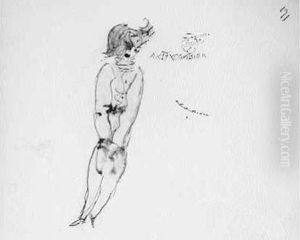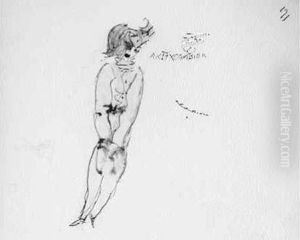Antoine De Saint-Exupery Paintings
Antoine de Saint-Exupéry, born Antoine Marie Jean-Baptiste Roger, comte de Saint Exupéry, was not primarily known as a visual artist, but rather as a French writer, poet, aristocrat, journalist, and pioneering aviator. He was born on June 29, 1900, in Lyon, France, into an old family of provincial nobility. Despite the early death of his father, which left the family in reduced circumstances, Saint-Exupéry was educated at the best schools. He initially went on to study architecture at the École des Beaux-Arts, but his studies were interrupted by his military service.
During his military service, Saint-Exupéry was stationed in Strasbourg and took private flying lessons, becoming a pilot. He embraced the profession of aviation with passion and it profoundly influenced his life and literary career. After leaving the military, he worked as an airmail pilot, flying routes over the Sahara Desert and the Andes, experiences that would later provide fertile ground for his literary work.
Saint-Exupéry's most famous work is 'The Little Prince' ('Le Petit Prince'), published in 1943. This novella, which he also illustrated, has become a classic of world literature and has been translated into over 300 languages and dialects. Although 'The Little Prince' is often considered a children's book, its themes of loneliness, friendship, love, and loss have resonated with a broader audience.
Apart from 'The Little Prince', Saint-Exupéry wrote several other works drawing on his aviation experiences, including 'Night Flight' ('Vol de Nuit') and 'Wind, Sand and Stars' ('Terre des hommes'), which won the U.S. National Book Award. His literary works are marked by a poetic and philosophical reflection on the nature of human existence and the human condition, often using aviation as a backdrop to explore these themes.
Tragically, Saint-Exupéry's life was cut short during World War II. As a reconnaissance pilot for the Free French Air Force, he disappeared on a mission over the Mediterranean Sea on July 31, 1944, and is presumed to have died at that time. His disappearance remained a mystery until 1998 when a French fisherman found a silver bracelet belonging to Saint-Exupéry off the coast of Marseille, and later, in 2000, the wreckage of his plane was discovered on the sea bed. Saint-Exupéry's legacy as an aviator and a literary figure continues to be celebrated around the world.




